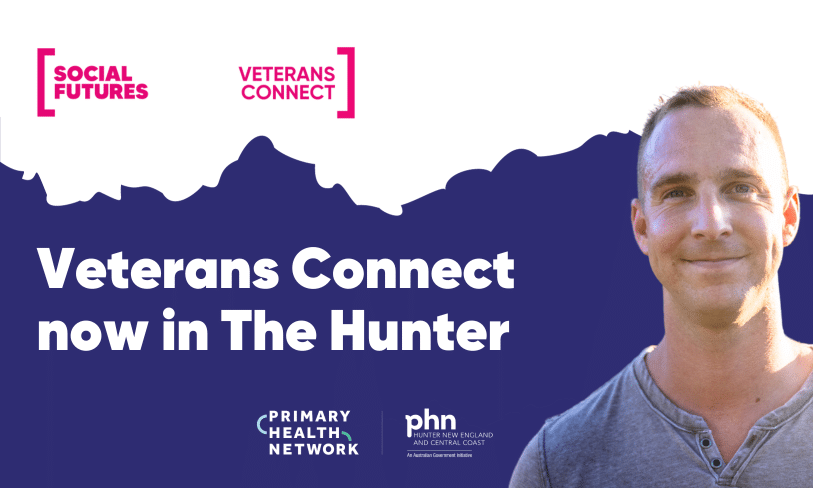
A new service that connects former Australian Defence Force (ADF) members and their families to the right health, wellbeing and community supports has arrived in the Hunter. Veterans Connect can link Veterans, their families and carers to a wide range of supports.
A new service that connects former Australian Defence Force (ADF) members and their families to the right health, wellbeing and community supports has arrived in the Hunter.
Social Futures delivers the Veterans Connect program in:
Veterans Connect can link Veterans, their families and carers to a wide range of supports – everything from Veterans’ peer groups to clinical services. Veterans Connect works as a central contact point, so returned service personnel are well supported in civilian life.
More than 20,000 former defence personnel call the Hunter region home with around 3000 serving personnel based in the region and some 1000 reservists. The Veterans Connect program is delivered by not-for-profit organisation Social Futures, with Care Coordinators in Maitland and on the Central Coast. Veterans Connect is supported by the Hunter New England and Central Coast Primary Health Network.
Social Futures CEO Tony Davies said the health, mental health and support needs of Veterans are diverse and unique and so must be the available supports and services to meet them.
“Veterans Connect can put Veterans and their families in touch with an array of supports like health and specialist clinical services and link them to a diversity of social support organisations, such as community groups, Veterans’ associations, and other wellbeing supports, such as gyms and physiotherapists,” Mr Davies said.
“The goal of Veterans Connect is to be a single point of contact, navigating all of the services available to support Veterans to overcome any barriers to accessing care.”
Acknowledging the varied experiences of former ADF personnel, ranging from warfare to peacekeeping and disaster response, Mr Davies highlighted common challenges faced, such as post-traumatic stress disorder, depression, alcohol misuse, and vulnerability to suicide.
“Younger Veterans may have been on multiple deployments and are now looking for new careers, reconnecting with family and friends, and processing their time with the ADF, while older veterans may be facing issues with ageing and ill health,” he said.
“We want to support people to establish meaningful and happy lives after leaving the ADF,” he said.
Veterans accessing the program will meet a Care Coordinator who will listen to their story, understand and identify their individual needs, then either directly assist or connect them to the right services.
“Your Care Coordinator can help in a wide variety of areas, even with practicalities like transport to medical or counselling appointments. We will act on your advice and outline all available options for support.”
The PHN Chief Executive Officer, Richard Nankervis, said that due to the complex support that veterans require, there is a high need for service navigation.
“Data shows us that veterans and their families are more vulnerable to mental health disorders resulting in a higher need for assistance with understanding and accessing appropriate health services,” Mr Nankervis said.
“Our aim is to see a reduction in the rate of mental health disorders and suicide in both the Central Coast and the Hunter and New England regions.”
To contact Veterans Connect call 1800 719 625 or email [email protected].
If you need immediate support call Lifeline Australia on 13 11 14.
This Veterans Connect service has been made possible by funding from the Hunter New England Central Coast Primary Health Network (the PHN).